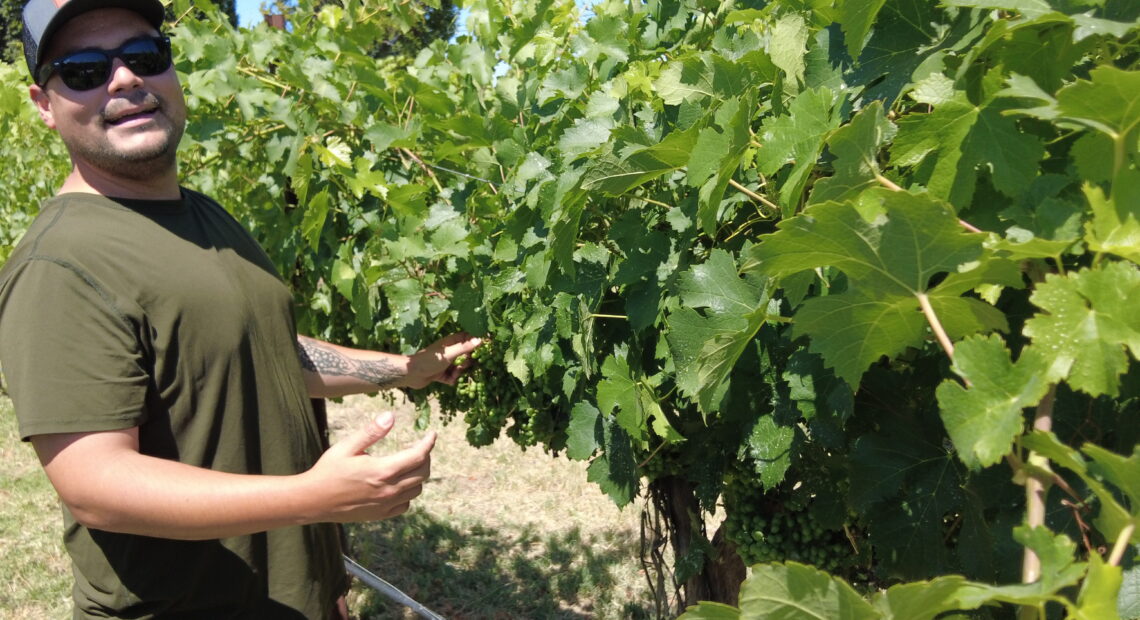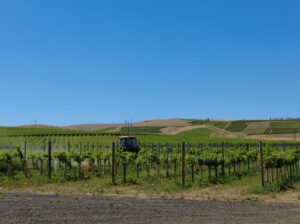
Washington Wine Industry: Breaking Ground
Listen
(Runtime 3:01)
Read
The multi-billion dollar wine industry in Washington state would not be what it is today without the field workers. The storytelling program Breaking Ground captures the stories about growers and winemakers and also the field workers.

Vineyard in Walla Walla Region
Seven Hills Walla Walla
Walking in the Seven Hills Vineyard on a hot summer day with Sadie Drury and Rosanna Lugo, the grass is high, insects buzz around the blooming flowers. The weeds have had a lot of moisture in the spring and have a good foothold this year. A field worker mows up and down the rows, trying to chop back the clover and thistle. Drury asks him to pause the tractor so rocks don’t get thrown. This year’s growing conditions are different from the last dozen or so. But what hasn’t changed are the field workers.
Drury: “We need these people. They are absolutely essential to the wine industry. “
That’s Sadie Drury. She is one of the participants in the Washington Wine Commission storytelling program, Breaking Ground, which for the first time gives a more diverse look at the wine industry. These stories are about the workers, the growers, the winemakers, and the changes that the wine industry is going through. In the past, only the owners and winemakers were given a platform to share their stories.
The modern Washington wine industry here in Walla Walla can be traced to the plantings in the last 40 or so years. Once a white, male-dominated industry with seasonal field workers that were mostly Latinos…Today, workers are not migrating from crop to crop as they did a few decades ago. Instead, they are long-time employees, who are raising families and putting down roots.
Rosanna Lugo says these workers are loyal because they have worked in this area for years.
Lugo: “That’s the love of seeing the work from start to finish.“
In Yakima Valley, we meet David Rodriquez. He is a Latino winemaker from Mexico, who studied winemaking in Argentina.
Rodriquez says he had never heard of Washington wine, then he tasted it.
Rodriquez: “And I was impressed, very, very impressed to the point that I started researching Washington.”
Rodriquez had a chance to transfer his earlier college credits and enroll in a program with Yakima Valley Community College.
Rodriquez bought a small parcel of land to grow grapes and to make wine. His mentors in the industry paired him with workers to learn from.
Rodriquez: “I basically joined as an intern at Dineen Vineyards, and and they, they put me to work side by side with them, and it was an enriching experience. I learned a lot, that you never learn on the books.”
Rodriquez says the industry relies on an influx of skilled workers, mostly from Mexico and other Latin countries. As an immigrant, he took Washington wine industry opportunities and hopes others, like him, do the same.
Today, Rodriquez also works with the Wine Commission as a translator and with the Breaking Ground program.
Rodriquez: “ Value that I think I bring into the you know, you know, into this industry, is to be able to communicate and help others engage and communicate too? I think language is a huge barrier. It’s not impossible to to, help and to overcome this.”
















